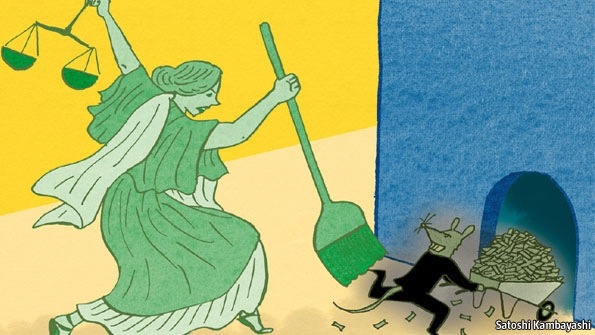 多年以来,巴西的政坛名声一直都不太良好,甚至可以说是相当腐败。1992年,巴西前总统费尔南多•科洛尔(Fernando Collor)因为受贿在办公室接受弹劾。保罗•马卢夫(Paulo Maluf)曾在其担任圣保罗州长及市长期间被美国相关部门指控盗窃行为,目前仍为国会议员。国会有要求许可,部长及议员若犯错误,在办公室接受弹劾并追究责任,但此行为仅限最高法院有权执行。这让有些政治人物甚至侥幸逃过“谋杀罪”的惩罚。议员阿农•德•梅诺(Arnon de Mello,科洛尔先生的父亲),曾于1963年开枪打死了参议院的另一位政治家,但却从未遭受审查。
多年以来,巴西的政坛名声一直都不太良好,甚至可以说是相当腐败。1992年,巴西前总统费尔南多•科洛尔(Fernando Collor)因为受贿在办公室接受弹劾。保罗•马卢夫(Paulo Maluf)曾在其担任圣保罗州长及市长期间被美国相关部门指控盗窃行为,目前仍为国会议员。国会有要求许可,部长及议员若犯错误,在办公室接受弹劾并追究责任,但此行为仅限最高法院有权执行。这让有些政治人物甚至侥幸逃过“谋杀罪”的惩罚。议员阿农•德•梅诺(Arnon de Mello,科洛尔先生的父亲),曾于1963年开枪打死了参议院的另一位政治家,但却从未遭受审查。
如此背景之下,定于8月2日举行、涉案人员多达38名的巴西最大腐败丑闻案件开庭审判,近年来看实属罕见。中央指控的“大型事件”案例是在2003年,工人党(Workers’ Party,PT)从广告预算及国家控股退休金计划中转移资金,用于贿赂立法者联盟党,以取得他们的支持。指控初起于2005年,2007年初步接受最高法院审理。而一直到了今天,法官们才正式决定认真审理。
此案中被告人员将面临一系列的指控罪名,包括贪污腐败、涉嫌阴谋、挪用公款、非法洗钱及滥用公共资金。部分人员承认他们曾帮助涉案政治人物抹掉犯罪记录,这是违法行为,但在巴西却是相当正常。但也有部分人员否认自己与非法犯罪行为有关联。
光靠听的,细数罪名的陈辞兴许得花上好几个月的时间。而且诉讼过程也许并不严厉:一些被告的律师可能认为,代理人在有权否认最高法院给出的宪法权利上诉判决。(虽然只有几位被告人员提出不服,但最高法院依然试图将他们结合在一起,因为这些指控是互相联系同为一体的。)
这些法律操纵可能会推动巴西过去的刑事犯罪重见天日。但是,几名仍活跃在共党的被告受审却可能推迟。也许要等到今年晚些时候的市政选举结束才会做出判决,以免民主党的紧张准备活动受影响。
因为考虑政治性后果,所以审判可能会温和进行。这也是由于巴西民意调查,人们呼吁他们“反对腐败”,因此工党自称要粉碎丑闻,缔造一个全新的、更干净的政治环境。然而,事情并非嘴上说的那样简单。
废除雄心勃勃的改革战术,在不久的将来实现几乎不大可能。没有他们,努力清理政府必须在现有的法律框架。政府必须努力将现有的法律框架清理掉,甚至可以说,审判程序是政治性的进步。然而,让腐败的政客成为阶下囚仍然不大可能发生,所以,仍然只是不可想象。
然而,与此同时,公共支出方面奉行更高的透明度将会使得财政部腐败亏空更加困难。如果他们怀疑预算已经衬垫,便只有强大的监管机构能够关闭政府项目(尽管这些保护措施可以在所谓的紧急情况下适当让步,比如为2014年世界杯修建体育场等)。全新的信息自由法案将使政客们更难实施贪腐行动。“这是大号的消息,”知名咨询公司欧亚集团(Eurasia Group)的分析师João Castro Neves表示,“在10至15年前的贪腐巴西,这一切都是不可想象的。”
A SLEAZY reputation has historically been little impediment to a long career in Brazilian politics. Fernando Collor, a former president impeached in 1992 and found guilty of corruption while in office, is back in the Senate. Paulo Maluf, who has been charged in the United States with theft related to a kickback scheme during his terms as governor and mayor of São Paulo, is now a congressman. Congressional permission is required for ministers and legislators to be investigated for crimes committed in office, and only the Supreme Court can try them. That lets politicians get away with murder—sometimes literally. Arnon de Mello, a senator (and Mr Collor’s father) shot and killed another politician in the Senate in 1963, but was never tried.
Against this backdrop, the trial, due to start on August 2nd, of 38 people accused of involvement in Brazil’s biggest corruption scandal of recent years is a rarity. The central accusation in the “mensalão” (big monthly stipend) case is that, after coming to power in 2003, the Workers’ Party (PT) diverted money from the advertising budgets and pension schemes of state-controlled firms to pay off legislators from allied parties, in return for their support. The allegations first surfaced in 2005, and the Supreme Court took on the case in 2007. Only now are the judges ready to try it.
The defendants face a range of charges including corruption, conspiracy, embezzlement, money-laundering and misusing public funds. Some admit they helped finance political parties off the books, which is illegal but common in Brazil. Others deny any role in the illicit payments.
Simply hearing the charges, evidence and statements will take months. The proceedings may be strung out further: some defendants’ lawyers will probably argue that trying their clients at the Supreme Court denies their constitutional right to appeal against any guilty verdict. (Only a few defendants held high office, but the Supreme Court will try them all together, since the charges are interconnected.)
Such legal manoeuvring could push many of the crimes past Brazil’s criminal-friendly statute of limitations. The few defendants still active within the PT may also want to delay the verdict until after municipal elections later this year, lest any convictions hurt the party in tight races.
The political fallout from the mensalão trial will probably be modest. The scandal shredded the PT’s claim to represent a new, cleaner politics, and Brazilians tell pollsters they disapprove of corruption. However, says Alberto Almeida of Instituto Análise, a political consultancy, they also assume that most politicians are dirty, and hence ignore even blatant graft when they vote. Luiz Inácio Lula da Silva, the president when the payments occurred, was re-elected one year after the news broke. He was popular for improving the lives of the poor, not for crusading against corruption, and neither his friends nor his foes are likely to change their views based on the mensalão verdicts.
Abolishing such tactics demands ambitious reforms, which are unlikely in the near future. Without them, efforts to clean up government must work within the existing legal framework. That the mensalão affair has even come to trial is progress: jail for corrupt politicians may still be unlikely, but it is no longer unthinkable.
Meanwhile, greater transparency about public spending is making theft from the treasury harder. Strong regulatory bodies can close down government projects if they suspect budgets have been padded (though such safeguards can be bypassed in supposedly urgent situations, such as building stadiums for the 2014 World Cup). A new freedom-of-information law should make it harder for politicians to stuff the public payroll with cronies. “The good news”, says João Castro Neves of the Eurasia Group, a consultancy, “is that to be corrupt in Brazil you need to be more creative now than ten or 15 years ago.”
 多年以来,巴西的政坛名声一直都不太良好,甚至可以说是相当腐败。1992年,巴西前总统费尔南多•科洛尔(Fernando Collor)因为受贿在办公室接受弹劾。保罗•马卢夫(Paulo Maluf)曾在其担任圣保罗州长及市长期间被美国相关部门指控盗窃行为,目前仍为国会议员。国会有要求许可,部长及议员若犯错误,在办公室接受弹劾并追究责任,但此行为仅限最高法院有权执行。这让有些政治人物甚至侥幸逃过“谋杀罪”的惩罚。议员阿农•德•梅诺(Arnon de Mello,科洛尔先生的父亲),曾于1963年开枪打死了参议院的另一位政治家,但却从未遭受审查。
多年以来,巴西的政坛名声一直都不太良好,甚至可以说是相当腐败。1992年,巴西前总统费尔南多•科洛尔(Fernando Collor)因为受贿在办公室接受弹劾。保罗•马卢夫(Paulo Maluf)曾在其担任圣保罗州长及市长期间被美国相关部门指控盗窃行为,目前仍为国会议员。国会有要求许可,部长及议员若犯错误,在办公室接受弹劾并追究责任,但此行为仅限最高法院有权执行。这让有些政治人物甚至侥幸逃过“谋杀罪”的惩罚。议员阿农•德•梅诺(Arnon de Mello,科洛尔先生的父亲),曾于1963年开枪打死了参议院的另一位政治家,但却从未遭受审查。
